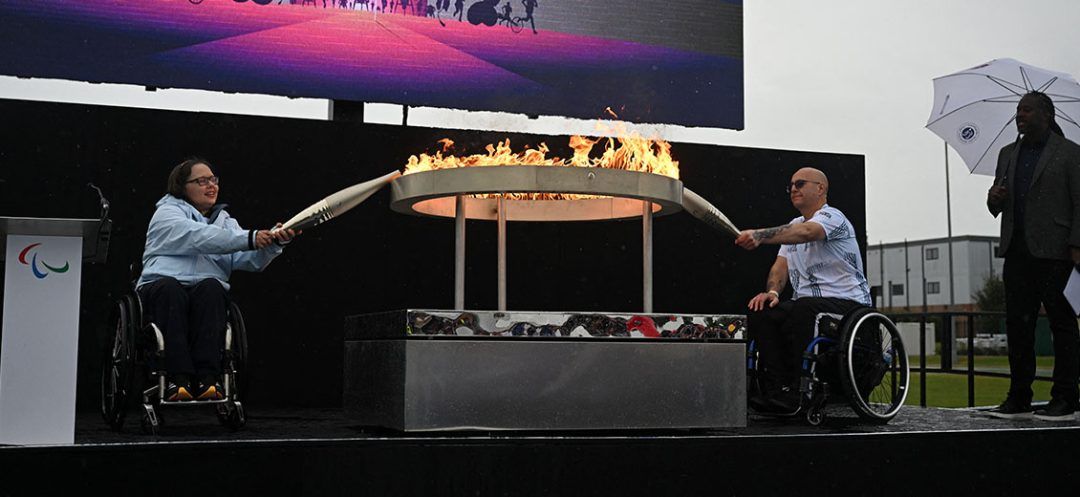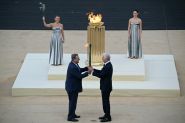
©(JUSTIN TALLIS / AFP)
The Paralympic flame arrived in France on Sunday via the Channel Tunnel, carried by Emmanuelle Assmann, a wheelchair fencing medalist. She was welcomed upon arrival by Amélie Oudéa-Castéra, the caretaker Minister of Sports and the Olympic and Paralympic Games.
Three days before the opening ceremony of the Paralympic Games, the French torchbearer arrived shortly after 1:00 PM (Paris time) in Coquelles (Pas-de-Calais) via the Eurotunnel service tunnel.
The flame, attached to her wheelchair, was carried by Emmanuelle Assmann, a bronze medalist in wheelchair fencing at the Athens Games in 2004. She was greeted by a guard of honor consisting of members of the organizing committee and children wearing white volunteer t-shirts.
“It’s about placing sports at the heart of people with disabilities,” said Oudéa-Castéra just before the flame’s arrival.
The flame will continue its journey to Calais, where the cauldron will be lit at 5:00 PM (Paris time).
It will then be "multiplied" into twelve Paralympic flames, which will be carried by 1,000 torchbearers across about 50 cities in 12 simultaneous relays.
These 12 relays will converge in Paris, where the flame will arrive on August 28 for the opening ceremony.
Lit on Saturday in Stoke Mandeville (Great Britain), the historic birthplace of the Paralympic Games, the flame began its journey by crossing the Channel via the approximately 50-kilometer-long tunnel.
It departed from Folkestone on Sunday morning, the last English city from where 24 British athletes started their crossing of the tunnel. They were joined halfway by 24 French counterparts.
The history of the Paralympic Games dates back to 1948, when German neurologist Ludwig Guttmann organized sports events for veterans who had become paraplegic or were confined to wheelchairs at Stoke Mandeville Hospital, northwest of London.
This event was planned to coincide with the 1948 London Olympic Games, marking the birth of the Paralympic movement.
(AFP)
Three days before the opening ceremony of the Paralympic Games, the French torchbearer arrived shortly after 1:00 PM (Paris time) in Coquelles (Pas-de-Calais) via the Eurotunnel service tunnel.
The flame, attached to her wheelchair, was carried by Emmanuelle Assmann, a bronze medalist in wheelchair fencing at the Athens Games in 2004. She was greeted by a guard of honor consisting of members of the organizing committee and children wearing white volunteer t-shirts.
“It’s about placing sports at the heart of people with disabilities,” said Oudéa-Castéra just before the flame’s arrival.
The flame will continue its journey to Calais, where the cauldron will be lit at 5:00 PM (Paris time).
It will then be "multiplied" into twelve Paralympic flames, which will be carried by 1,000 torchbearers across about 50 cities in 12 simultaneous relays.
These 12 relays will converge in Paris, where the flame will arrive on August 28 for the opening ceremony.
Lit on Saturday in Stoke Mandeville (Great Britain), the historic birthplace of the Paralympic Games, the flame began its journey by crossing the Channel via the approximately 50-kilometer-long tunnel.
It departed from Folkestone on Sunday morning, the last English city from where 24 British athletes started their crossing of the tunnel. They were joined halfway by 24 French counterparts.
The history of the Paralympic Games dates back to 1948, when German neurologist Ludwig Guttmann organized sports events for veterans who had become paraplegic or were confined to wheelchairs at Stoke Mandeville Hospital, northwest of London.
This event was planned to coincide with the 1948 London Olympic Games, marking the birth of the Paralympic movement.
(AFP)
Read more




Comments